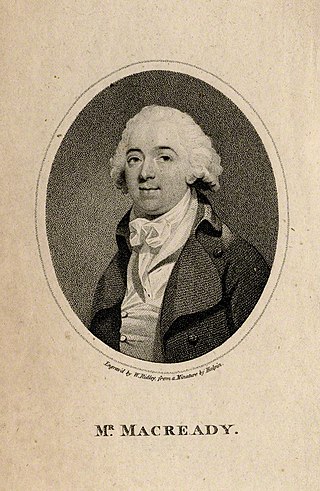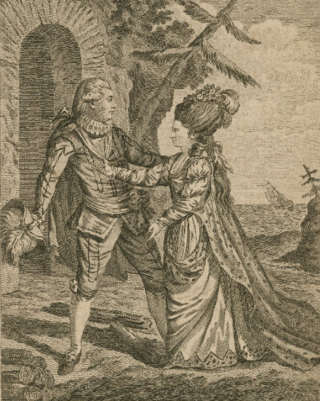Related Research Articles

John Ward was an English actor and theatre manager. The founder of the Warwickshire Company of Comedians – a Birmingham-based theatre company who toured throughout the West Midlands and into Wales during the mid to late eighteenth century – he was the first of the Kemble family theatrical dynasty, whose most notable member was his granddaughter Sarah Siddons. Ward was the first recorded performer of a Shakespearian play in Stratford-upon-Avon, and is also notable as the author of the two earliest surviving prompt books of Shakespeare's Hamlet, which reveal how the play was performed in eighteenth century England and also throw light on earlier practice.
The Warwickshire Company of Comedians, also known as Mr Ward's Company of Comedians and after 1767 as Mr Kemble's Company of Comedians, was a theatre company established by John Ward in Birmingham, England in the 1740s, touring throughout the West Midlands region and surrounding counties over subsequent decades. Unusual in the 18th century as a provincial company producing performances to London tastes and standards, it is particularly notable as the origin of the Kemble family theatrical dynasty, which was to dominate the English stage in the late-18th and early 19th centuries. Sarah Siddons and John Philip Kemble in particular, who were Ward's grandchildren and whose careers began in the company, were the leading actress and actor of their time, and are still considered among the greatest performers in English theatrical history.

William Macready the Elder (1755–1829) was an Irish actor-manager.
Jane Rogers was a British stage actress.
Henry Giffard (1694–1772) was a British stage actor and theatre manager.
William Hamilton was an Irish stage actor of the eighteenth century.
John Sowdon was an Irish stage actor, singer and theater manager in the eighteenth century.
James Rosco was a British stage actor. His name is also written as James Roscoe.
Charles Hulett (c.1700-1735) was a British stage actor. His name is sometimes written as Charles Hulet.
Thomas Smith was a British stage actor of the eighteenth century.

George Mattocks (1735–1804) was a British stage actor and singer.
Thomas Barry (1743-1768) was an Irish stage actor and theatre manager.
Thomas Griffith (1680-1744) was an Irish stage actor and theatre manager.
Richard Cross was a British stage actor.
Frances Cross (1707-1781) was a British stage actress.
Luke Sparks (1711–1768) was an Irish stage actor of the eighteenth century.
Isaac Sparks (1719–1776) was an Irish stage actor.
Montague Talbot (1774–1831) was an Irish stage actor and theatre manager.

Nannette Johnston was a British stage actress and dancer active during the Regency era. She was born in London as the daughter the actor William Parker, but educated in Edinburgh where her father was working and began her career as a dancer. In 1796 she married the actor Henry Erskine Johnston, with whom she had six children, and the then went to Dublin for a season before heading to London where she acted at Covent Garden and the Haymarket. They both moved to Drury Lane for two seasons, before returning to Covent Garden.
John Waddy (1751–1814) was an Irish stage actor and theatre manager. Originally, intended for a career in law, he was acting at Dublin's Smock Alley Theatre by 1774, combining this with appearances at Irish and English provincial theatres. From 1782 to 1796, he was a regular at the Theatre Royal, Norwich. He was then engaged by the Theatre Royal, Covent Garden in London making his debut there on 5 October 1796, under the management of Thomas Harris. He acted there and at Haymarket over the next decade and a half. He particularly specialised in playing Stage Irishman and also took over many roles when John Quick left Covent Garden. His second wife, billed as Mrs. Waddy, acted with him in London for several years. He departed from the Covent Garden company in 1810, and worked for a while at the Surrey Theatre south of the River Thames. He died in Oakingham in Berkshire on 12 April 1814.
References
- ↑ Johnston. The Musical Life of Nineteenth-Century Belfast.
- ↑ Highfill, Burnim & Langhans p.163-65
- ↑ Highfill, Burnim & Langhans p.165
- ↑ Highfill, Burnim & Langhans p.165
- ↑ Highfill, Burnim & Langhans p.165
- ↑ Highfill, Burnim & Langhans p.166
- ↑ Highfill, Burnim & Langhans p.166-67
- ↑ Highfill, Burnim & Langhans p.167
- ↑ Highfill, Burnim & Langhans p.167